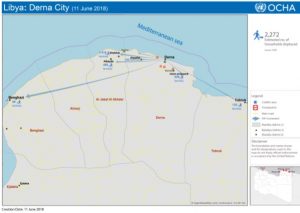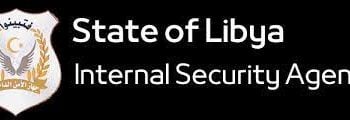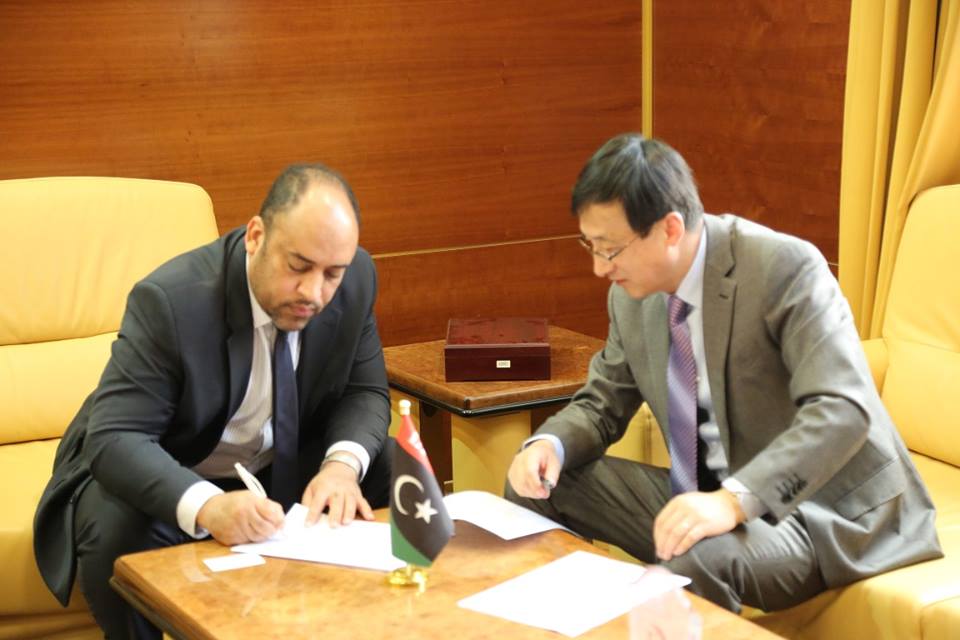By Sami Zaptia.

London, 12 June 2018:
The UN has renewed its call for humanitarian access into the city of Derna where the Hafter-led Libyan National Army (LNA) claims it is in control of 75 percent of the city.
The UN Office for the Coordination of Humanitarian Affairs (OCHA) 11 June report states that it fears that ‘‘as the LNA takes full control of Derna, there are concerns that human rights abuses will likely increase, given the serious violations of human rights law and international humanitarian law that were documented during fighting for control of the eastern oil crescent and for parts of the city of Benghazi, in early 2017’’.
In its latest report, the UN said that as of 11 June, the Libyan National Army (LNA) is now reportedly in control of most areas of the eastern coastal city of Derna. Since 6 June, reportedly at least 2,272 households have been displaced from Derna to the baladiyas of Shahat, Alqubba, Albayda, Umm Arrazam and Benghazi. Within Derna, at least 800 families have been displaced between neighbourhoods. Reportedly, as of 9 June, at least 160 families are being hosted in IDP shelters in schools inside the city.
The report said the humanitarian needs in Derna are rapidly increasing, with severe shortages reported for medicine and medical supplies, but also food, water, fuel, and cooking gas. Eighty per cent of the city’s electricity has returned after a power cut, however water remains cut off.
It says that the humanitarian community remains concerned for the protection of civilians in Derna and reminds all parties to the conflict of their responsibilities to protect civilians, allow safe and unhindered passage for those wishing to leave the city, and to immediately provide safe, sustained and unfettered access for humanitarian supplies.
The report says that the tightened encirclement and closure of Derna, imposed by the LNA, has been ongoing since July 2017. Periodic escalations of armed conflict occur, as witnessed since mid-April when the LNA announced it would start a large-scale offensive against armed groups in Derna. Since then airstrikes, shelling, artillery fire and fighting between armed groups have been ongoing at various intensities.
The latest report says that since its last update on 30 May, the escalation of fighting continued as the LNA advanced further into the city centre of Derna. Heavy shelling, airstrikes and artillery fire were reported in several areas in the city, resulting in reportedly civilian casualties and bodies under rubble and in the street, including those of women and children. As of 10 June, the LNA fighting has decreased but parts of downtown Derna are still contested and civilians remain caught in the middle of the clashes.
As a result of the clashes, the International Organization for Migration (IOM) has reported that since 6 June, at least 2,272 households have been displaced (approximately 11,360 individuals) from Derna to the baladiyas of Shahhat (Shahhat Al Jadida, Shahhat Al Kadima and Soussa muhallas), Alqubba, Albayda, Umm Arrazam, and Benghazi. The majority of displaced families are currently staying in private accommodation while some are being sheltered in schools in the communities of Shahhat, Soussa, Umm Arrazam, Albayda and Al Qubba.
It adds that reported priority needs include food, cooking utensils, non-food items and basic medical supplies. The Libyan Red Cross has begun a registration process in three areas surrounding Derna for internally displaced (IDP) families leaving including in the neighbouring city of Shahhat. In fear of prosecution due to tribal backgrounds, some families left instead to western Libya to Tripoli, Misrata and Zliten, though numbers are currently unknown.
Within Derna, the report continues, at least 800 families have been displaced between neighbourhoods. Reportedly, as of 9 June, at least 160 families are being hosted in IDP shelters in schools inside the city. Since the start of the escalation of the security situation in Derna in mid-May, according to the IOM at least 2,812 families (approximately 14,060 individuals) have been displaced to surrounding areas of Derna.
Despite reassurances by the LNA that civilians would be protected, the report says that civilians are still being affected by the conflict and there are reports of human rights violations. According to a local source, reportedly four children died during the week of 4-10 June from mortar bomb shelling. Furthermore, the Libyan Red Crescent Derna branch reported that it had recovered nine bodies from the clashes zone.
As the LNA takes full control of Derna, the report adds, there are concerns that human rights abuses (for civilians and fighters who have surrendered, laid down their weapons, are sick or wounded, or otherwise hors de combat) will likely increase, given the serious violations of human rights law and international humanitarian law that were documented during fighting for control of the eastern oil crescent and for parts of the city of Benghazi, in early 2017.
The report says that concerns regarding movement restrictions placed on civilians also remain. The Kirsa checkpoint, west of Derna, had previously been reportedly closed since 18 May. It had initially reopened on 28 May allowing a limited number of families to exit Derna but was closed again after a landmine exploded in a civilian car near the checkpoint on 29 May reportedly killing up to six individuals. On 30 May the checkpoint was reopened only during the day for a limited number of hours allowing families to exit Derna, and remains so up until publication of this report. The main check point in eastern Derna, Martuba was reopened on 20 May allowing limited civilian movement, but also only opens for a few hours a day.
On 5 June, the only functioning hospital in Derna was reportedly hit by mortar shells, the report adds, forcing the hospital to close. Due to this, citizens in Derna had no access to health care facilities as this was the only functioning one. The closest functioning health care facility is 26 km away in Martuba.
Following the closure, the Deputy of the Ministry of Health of the Interim Government announced on 11 June that two primary healthcare centres (Bab Tobruk and Al Sahel) as well as the hospital will gradually resume function. He asked health workers in those health facilities to start returning to work. The hospital started functioning on 11 June with limited health personnel and the surgical department was reopened. Furthermore, Al Najah private hospital Al Najah and Al Manar Clinic in Al Sahel area will be used for maternal health. In addition, nearby hospitals in Kirsa and Soussa have been equipped and are ready to receive patients, the report says.
With regards to the humanitarian overview, the report says that the humanitarian needs in the city are rapidly increasing, with severe shortages reported for medicine and medical supplies, but also food, water, fuel, and cooking gas. Residents reported that because of limited movement due to the ongoing clashes and the closure of markets, they have been unable to purchase basic food items as prices also considerably increased. Cooking gas remains to be unavailable in Derna, forcing residents to use alternative cooking methods such as outdoor clay ovens. There is a large shortage of milk, eggs, vegetables, meat, drinking water, flour and rice. Eighty per cent of the city’s electricity has returned after a power cut that lasted for two days, whilst water remains cut off to the 125,000 residents of the city.
The report says that on 8 June, the LNA granted safe passage to the Libya Red Crescent (LRC) to allow humanitarian assistance to enter the city. The safe passage is also being used as a corridor for families to leave conflict affected areas and more than 320 families were reportedly able to leave Derna when the passage opened. The LRC provided food and non-food items to 1,800 families living in areas of conflict in Derna. The LRC has set up emergency telephone numbers as of 9 June to help civilians flee conflict areas after hostilities infiltrated densely populated neighbourhoods.
Furthermore, from 9 June the LRC also started to deliver food and non-food items to over 6,000 affected persons (1,000 households) in Bab Tobruk. According to the LRC, a school in Bab Tobruk is reportedly being used as an IDP centre as well as an emergency room. IDPs in the surrounding cities of Derna have also received food and non-food items, beginning with 6,000 persons (1,600 households) in Shahhat.
The Interim Government in Albayda is reported to have formed a crisis committee to respond to the humanitarian needs of IDPs. Other humanitarian actors are distributing urgently needed items to several hundreds of families who managed to leave Derna but all items pre-positioned to enter Derna are pending approval.
On 9 June, the LNA announced that it is working with the civil authorities in Derna to provide food, medicine and fuel and on 11 June, fuel entered Derna for the first time in two years.
With regards to the response to the crisis, the report said that on 29 May, WHO sent kidney dialysis materials and medicines to Derna Hospital. The supplies could cover 18,000 dialysis sessions. On 1 June, WHO also sent 50 oxygen cylinders to Derna. On 8 June, LRC provided food and non-food items to 1,800 families living in areas of conflict in Derna. On 9 June the LRC, also started to deliver food and non-food items to over 6,000 affected persons (1,000 households) in Bab Tobruk. IDPs in the surrounding cities of Derna have also received food and non-food items distributed by the LRC, beginning with 6,000 persons in Shahhat (1,600 food and non-food items including hygiene kits). On 11 June, two trauma kits were delivered to Albayda and Tobruk hospitals via the LRC.
With regards to future health measures, the UN report says that medical supplies in the form of one interagency emergency health kit is currently being transported and will be delivered to the city’s hospital by the LRC. Medical and surgical supplies including insulin sent by the Ministry of Health are also currently on their way to Derna.
WHO have sent two non-communicable disease kits for delivery on 11 June and UNICEF is planning to distribute five interagency emergency medical kits to assist 50,000 people and are currently exploring methods to deliver them to Derna.
With regards to food and non-food items, the report says that these will be distributed by LRC to 350 families in Alqubba and 400 families in Albayda. UNICEF also plans to distribute High Energy Biscuits for the children of the 150 households displaced to Albayda and the UNHCR is preparing with LibAid for the provision of family packages. The WFP is planning on delivering food with the support of the LRC, within the next couple of weeks.
UNICEF will be locally procuring and assembling WASH materials in Albayda to provide for 150 Derna IDP households in need. UNICEF is also planning to locally procure and assemble education materials for 300 children in 150 Derna IDP households in Albayda.
With regards to child protection, UNICEF is planning to locally procure and assemble child protection materials in Al Bayda for the IDPs coming from Derna.
In conclusion, the UN report says that humanitarian actors reiterate their call on all parties to:
- Meet their obligations under international humanitarian and human rights law and ensure civilians’ freedom of movement and facilitate the safe exit of those civilians wishing to leave Derna
- Respect international humanitarian law (IHL), and accordingly to take all feasible precautions during the conduct of hostilities to protect civilians from the effects of attacks and, to the extent feasible, to avoid locating military objectives within or near densely populated areas.
- Armed actors must at all times distinguish between military objectives and civilians and civilian objects. Direct attacks on civilians and indiscriminate attacks are prohibited under IHL.
- Allow access of humanitarian assistance intended for civilians in need, lift restrictions on the movement of humanitarian relief personnel and civilians in need of urgent assistance, and grant humanitarian organisations unimpeded access to Derna.
- Ensure the safety and sanctity of health infrastructure and health human resources as enshrined in successive World Health Assembly Resolutions.
https://www.libyaherald.com/2018/06/12/two-lna-deaths-and-three-injuries-in-latest-derna-fighting/
https://www.libyaherald.com/2018/06/06/lna-claims-it-is-now-in-control-of-75-percent-of-derna/










